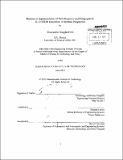Barriers to implementation of new programs and pedagogies in K-12 STEM Education : a systems perspective
Author(s)
Hird, Mackenzie Douglas
DownloadFull printable version (13.69Mb)
Alternative title
Barriers to implementation of new programs and pedagogies in K-12 Science, Technology, Engineering and Math Education
Other Contributors
Massachusetts Institute of Technology. Engineering Systems Division.
Advisor
Richard Larson.
Terms of use
Metadata
Show full item recordAbstract
The continued usage of poor pedagogies in K-12 classrooms, despite large pressures for teachers to change their practice, points towards systematic barriers to change. In the last few decades, there has been a national focus to improve Science, Technology, Engineering and Math (STEM) Education. Driven by their concern for developing their future workforce, science and technology companies have invested billions of dollars in improving student outcomes. Further, the federal and state governments have responded by adopting new policies meant to improve student performance. Promising new pedagogies, such as Project Based Learning or the Flipped Classroom, have been developed alongside new technologies to complement them. Yet despite this support, pedagogical practice has not drastically changed and students are primarily taught through lectures and homework sets. This thesis argues that teachers do not adopt new pedagogies because they are under short-term pressure to improve test scores, often face an uphill battle against their school culture and/or do not have deep enough pedagogical or content expertise. A causal model of pedagogical implementation barriers is developed using the results of in-depth surveys and interviews of administrators, principals and teachers. Within this model, critical points of leverage are identified that can interrupt the negative feedback loops creating pedagogical lock-in, and three case studies of international attempts at pedagogical reform are presented to illustrate effective strategies to utilize these leverage points. General policy recommendations are then developed that will remove the current system of pressures and incentives for teachers to use rote memorization and incentivize use of more effective pedagogies.
Description
Thesis (S.M. in Technology and Policy)--Massachusetts Institute of Technology, Engineering Systems Division, 2013. Cataloged from PDF version of thesis. Includes bibliographical references (p. 85-97).
Date issued
2013Department
Massachusetts Institute of Technology. Engineering Systems DivisionPublisher
Massachusetts Institute of Technology
Keywords
Engineering Systems Division.